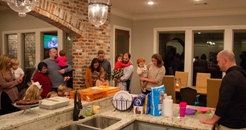 Transitioning from a 'come and see' to a 'go and be' church - 1
Transitioning from a 'come and see' to a 'go and be' church - 1
From a talk on Exponential
For leaders of existing churches, especially a traditional model, transitioning to or incorporating new models can be difficult and daunting.
Jeff Clark is a church leader in Mississippi, USA. His first transition was to changing a large Southern Baptist Church - First Baptist, Hattiesburg to Venture Church.
He says, "People don't like change. And when you're in a church, no matter how old it is, how many people are in it, there's usually a few people that run the church. And it's just hard to get around those people. But revitalization of our church was what God called me to do and I began the transition that was painful. It's going to be painful, there's no way to get around that."
They moved from an 1884 model, when the church was started, to growth over time and now have five campuses - a multi-site church. They changed the name, stopped the choir, stopped the Sunday School, sold old fittings and equipment. They changed a lot of their philosophy and their approach and practises - same gospel, added relevance, putting in a different structure.
Jeff says, "It is a difficult thing that we do. What I don't want is, to do what I do without the anointing of God."
Now a second transition is underway. In the autumn of 2020, Jeff Clark laid out a vision for the next ten years at Venture Church. Whereas the previous decade was marked by a “come and see” model of church, the future would be led by a “go and be” model.
Venture Church is transitioning to a church of House Churches (think Acts 2 house churches as opposed to housegroups or small groups).
Believers in the New Testament gathered in homes for discipleship where they became deeply connected and experienced an intimate community of faith. At Venture, House Churches are a small, diverse, and intimate community of people defined by compassionate care, devoted discipleship, generous giving, and selfless care. They are lay led and baptise new converts, visit the sick, etc.
Jeff and the interviewer continue:
I had said for years that the church is not the building. And if we didn't have a building, it wouldn't matter, but I didn't change anything. And then COVID hit and I really had this moment of feeling lost. And I was like, God, what do we do? If you'll give me another chance and if you'll show me, I won't be in the same predicament. And so that was the beginning of me really grappling with change.
I saw that that we weren't really building disciples. There was heavy centralization - full-time leader-led, building central. The shift we're talking about is distributed leadership. We're talking about a decentralisation from a heavy, predominantly 'clergy-led' church to 'lay leading' at its base level. It's identifying, equipping, and elevating, and then empowering 'lay leaders' and creating communities for them to lead.
I began to see a group of people that were beginning to rise up. And it dawned on me that we were asking these amazing leaders in the community, amazing Christians to hold the door open at church and to serve coffee. And that there was just more for them than what we're asking them to do. They were a resource that God had given us that we were not being good stewards of. I was already seeing God do something in these people. They wanted to do more - they lead businesses that make millions of dollars and we got them throwing frisbees.
I wanted to help them actually lead people. They're engineers, or electricians, or doctors, or teachers and they're actually called and equipped to pastor people as I am. Something had to shift in my mind. What was that shift? Not just I can get high capacity people throwing frisbees, but I can empower people to pastor.
We launched with 39 house churches. There was a sense of we were ready for something but we didn't know what it was. What we're actually talking about is a structural change. The shift was to a distributed pastoral leadership model. Your ecclesiology has to somehow evolve. How do our people gather and who leads them? And what do they do when they gather? And what's the purpose of their gathering?
Every church says, well, of course, we gather on Sundays and then we gather in small groups and then we do ministries. But if you go to Acts 2 and house to house, the way we were doing discipleship was not biblical. Small groups were doing Bible study, praying and having fun. Now they pastor, lead weddings, funerals, benevolence, counselling, community discipleship, etc. It's all centred now in a house church.
We really had to tear down our group system and say, we're never doing that again. That's not where we're going. Then we gather on the weekend as a reunion of our house churches. We're a church of house churches.
Going to people who had led groups, who weren't going to be in the process of becoming a house church leader, was hard. We had some great people that were willing to lead groups, but we had to say, "No, we're doing this,". For those unwillingly to change, we let them continue do what they were doing and it has not succeeded. And now some of them are coming back into house churches. They're starting to see the vibrance, the richness, the comprehensiveness of a house church versus a small group. And now a small group does really seem really limited in what it's accomplishing. It's not bad. It's just not best.
Watch this 5 min video of Jeff introducing house churches:
Part 2 of this blog is here.
Retweet about this article:
From a talk on Exponential, 23/11/2021